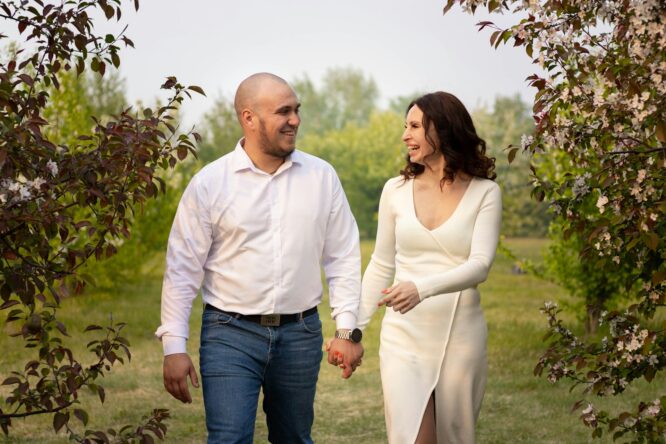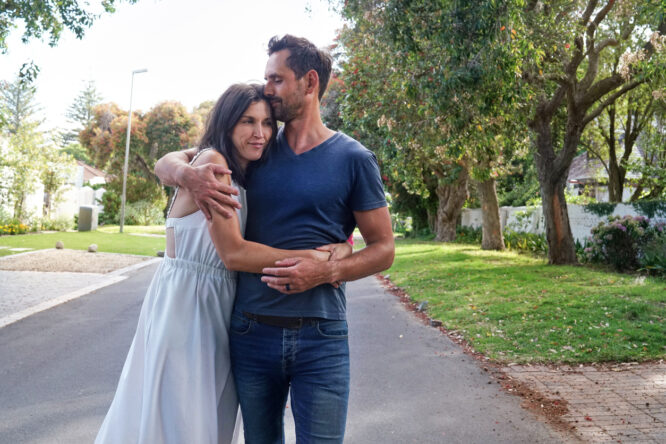It’s one of those things that sounds simple until you actually try to explain it clearly.

What’s the real difference between loving someone and being in love with them? The two feelings can overlap, blur, or even get confused entirely. However, there’s a big emotional gap between caring deeply for someone and feeling that magnetic, heart-pulling kind of love that people write songs about. If you’ve ever felt torn, stuck, or just unsure in a relationship, these signs might help make it all a little clearer.
1. Loving someone can feel steady; being in love often feels intense.

When you love someone, it’s often calm, safe, and rooted in connection. It’s the kind of feeling that shows up in reliability and care, like always wanting the best for them, even without butterflies. Being in love tends to hit harder. It can feel all-consuming, emotional, and sometimes even messy. It’s not just about comfort. It’s about passion, excitement, and that deep sense of being drawn to someone no matter what.
2. You can love someone without wanting a future with them.

It’s entirely possible to care about someone deeply and still know they’re not the person you want to build a life with. You might have affection, memories, and loyalty, but not the kind of connection that fuels long-term growth together. Being in love usually includes that future-thinking. You picture shared experiences ahead, not just clinging to the past. It feels forward-facing, like you’re building toward something, not just holding onto what was.
3. Being in love often involves attraction, but love doesn’t always.

Attraction isn’t everything, but it usually plays a role in being in love. There’s a spark, physical chemistry, or an emotional pull that feels electric in some way. It’s not just closeness—it’s desire. On the other hand, you can love someone like family, like a best friend, or from a distance without that same pull. It’s more gentle and less charged, which is lovely, but also different.
4. Loving someone can survive logic, but being in love can ignore it.

Love often makes sense. You admire someone, respect them, and feel close because of shared values or connection. It holds up under rational thinking. Being in love doesn’t always play by those rules. It’s the kind of feeling that shows up even when things don’t quite add up on paper. You can be in love with someone who challenges you, frustrates you, or doesn’t fit the mould, and still feel pulled in.
5. Being in love creates urgency, but love allows space.

When you’re in love, there’s usually a kind of emotional urgency—the need to be close, to talk, to connect right now. It can feel impatient, intense, or even overwhelming. Loving someone often feels slower and more measured. You don’t panic if they need space. You trust the bond without needing constant reassurance. It’s less about needing them in every moment, and more about being there when it matters.
6. Love can exist without romance, but being in love usually can’t.

You might love a close friend, an ex, or even a co-worker who’s been through life with you. That connection can run deep without ever crossing into romantic territory. Being in love almost always involves some kind of romantic longing, whether it’s expressed or not. There’s a difference between caring about someone and wanting to build intimacy and life together in that way.
7. Being in love can come with idealism, while love sees the flaws.

When you’re in love, especially early on, it’s easy to idealise someone. You focus on the best parts, overlook red flags, or imagine a version of the relationship that’s a bit shinier than reality. Loving someone tends to be more grounded. You see the flaws, the habits, the imperfections, and care about them anyway. It’s not about fantasy. It’s about choosing someone even with the rough edges in full view.
8. Love can survive change, but being in love sometimes fades with it.

If you love someone, that feeling can stick around even as you both evolve. It’s not tied to how they used to be or who you were in a certain phase—it grows and adjusts. Being in love can be more fragile in that way. The chemistry might shift. The spark might fade, and sometimes, what felt magnetic stops making sense once the context changes. That doesn’t mean it wasn’t real. It just means it didn’t stretch as far as you hoped.
9. Being in love often wants more; love can be content.

When you’re in love, there’s usually a craving for closeness, for deepening, for shared everything. It often pushes for more—more time, more commitment, more intimacy. Love, especially the steady kind, can exist quietly. It doesn’t demand or press. It just is. It’s possible to love someone without needing anything extra from them, and that kind of love can be powerful in its own way.
10. You can be in love and still not be compatible.

That part hurts. You can be head over heels for someone and still realise you don’t actually work well together long-term. Chemistry and compatibility aren’t always on the same team. Loving someone, though, can often come from a deeper place of understanding and alignment. It’s not just heat, it’s harmony. And while that might not feel as thrilling, it tends to last longer when it’s real.
11. Love can stay even after being in love fades.

That’s why breakups can feel so confusing. You might not be in love anymore—no butterflies, no longing—but you still love the person deeply. You still care. You still want good things for them. Being in love fading doesn’t mean it was fake. It just means it reached its time limit. What’s left behind can still be meaningful, even if it’s not romantic anymore.
12. Being in love can feel like falling, but love feels like staying.

That “falling” feeling is real. It’s exhilarating, unsteady, and kind of addictive. Being in love often comes with that rush, especially in the early stages. Loving someone, though, feels like choosing to stay through boredom, through frustration, through quiet moments that don’t go viral. It’s not about the high. It’s about the depth.
13. Love holds on gently, but being in love can grip too tight.

Being in love can come with fear—fear of losing them, of things changing, of not being enough. That fear can lead to clinging, jealousy, or overthinking everything. Loving someone tends to be more secure. It trusts. It allows. It doesn’t need to grip tight to feel safe. That kind of love often creates more breathing room, and less emotional chaos.
14. You can be in love for selfish reasons, but love is rarely about ego.

Sometimes being in love is more about how someone makes you feel than about who they actually are. The rush, the validation, the attention—it can all feed your ego, even if you don’t realise it. Love, the real kind, asks more of you. It’s less about what you get and more about what you give. It’s less about possession and more about presence. It doesn’t always flatter you; sometimes, it humbles you instead.
15. Being in love doesn’t guarantee a good relationship.

You can be wildly in love and still argue all the time, miscommunicate, or struggle to meet each other’s needs. The feelings might be strong, but the relationship might not be healthy or sustainable. Loving someone—really loving them—often shows up in the quiet work. The patience. The care. The consistency. It’s what keeps things steady long after the infatuation wears off.
16. Love is a decision, but being in love is a feeling.

Feelings change. They rise and fall depending on stress, timing, mood, hormones—all of it. Being in love is a rush, and like any emotion, it comes and goes. That’s why relationships built only on being in love often don’t last. Loving someone, though, is a choice. It’s the daily decision to show up, be kind, listen well, and stay connected even when it’s not easy. While that might sound less exciting, it’s the kind of love that actually holds a relationship together over time.




